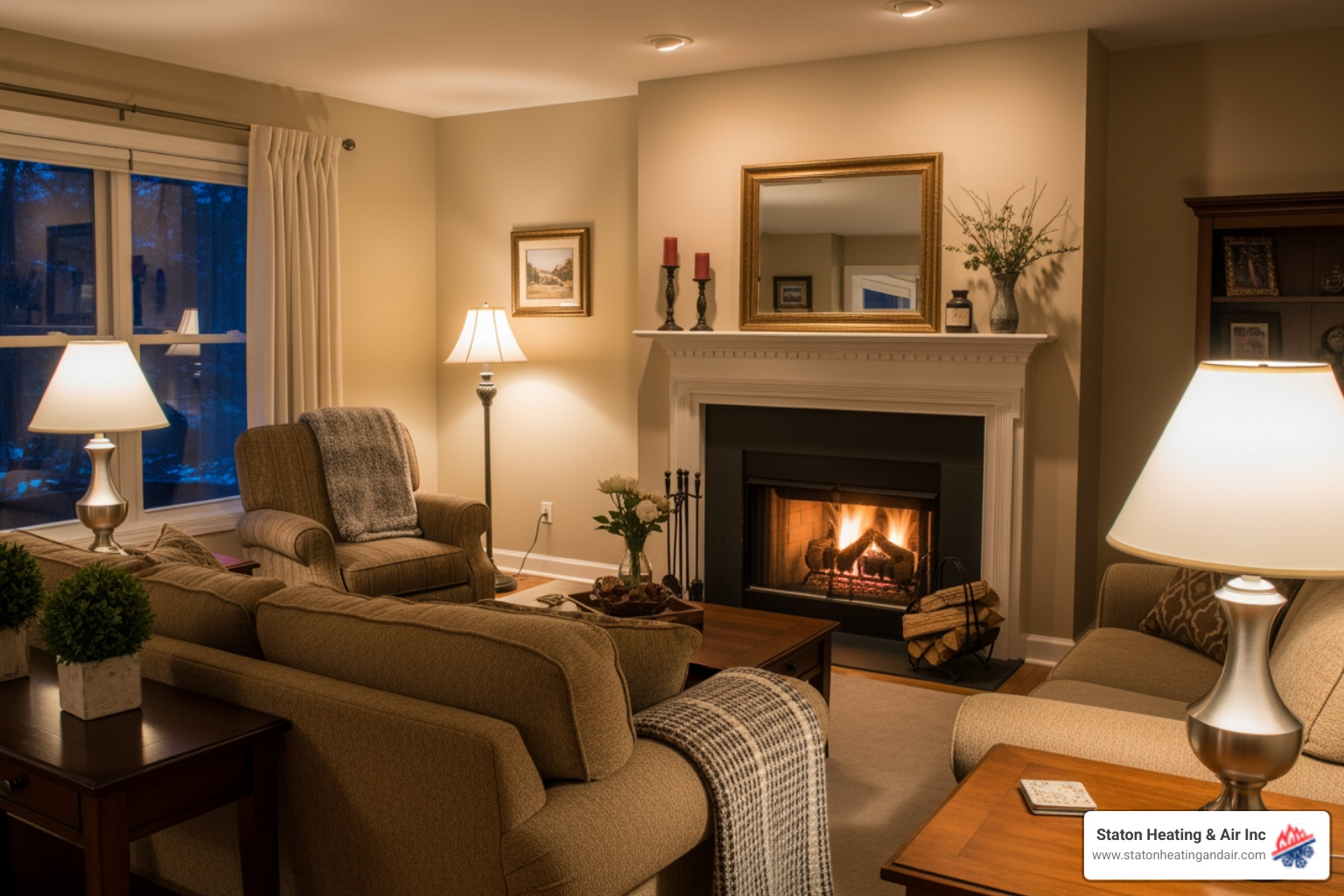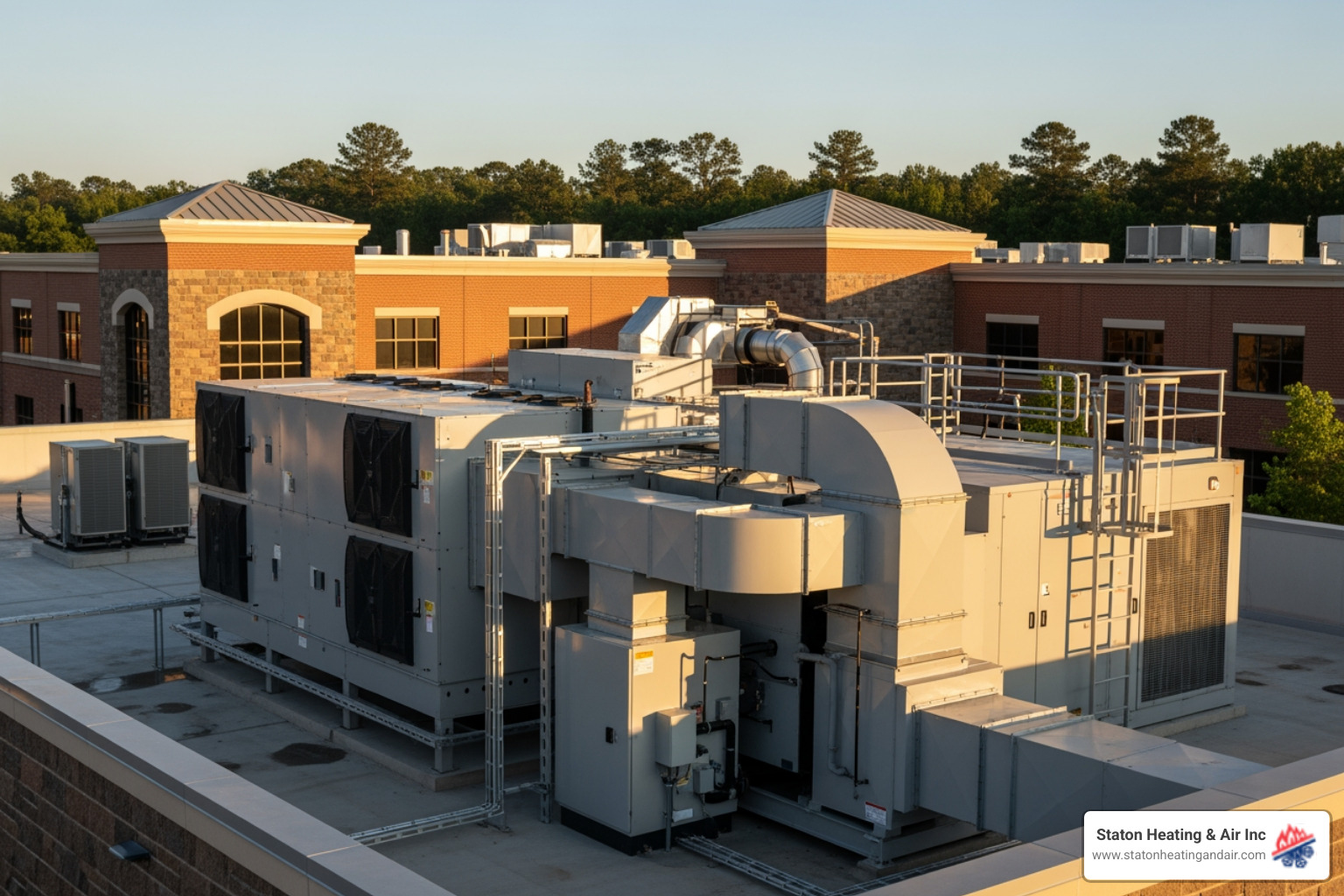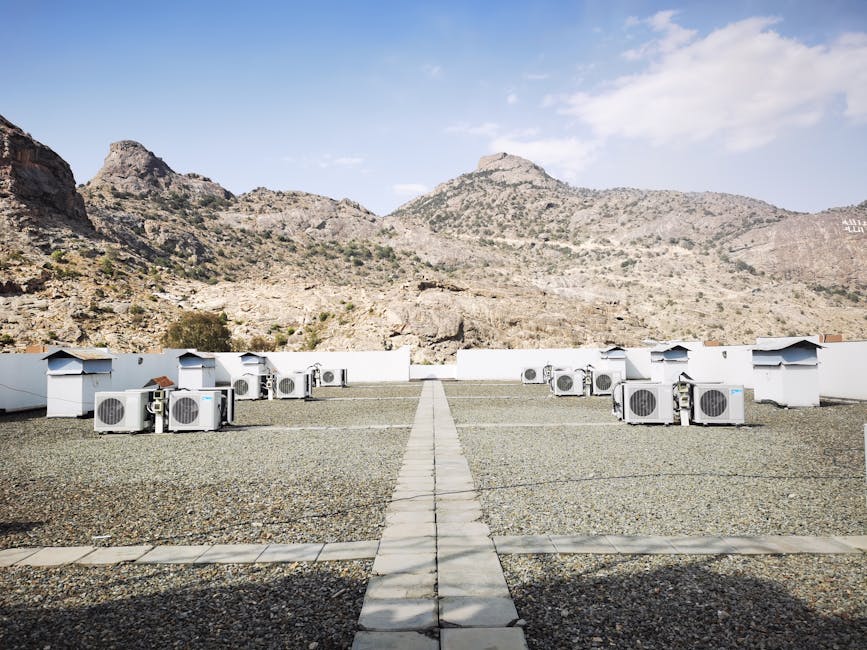The AC Symphony: Decoding and Fixing Your Unit's Unwanted Sounds
Your Guide to a Quiet and Cool Home
A noisy AC unit can quickly turn your cool sanctuary into a source of frustration. An air conditioner that's louder than a normal conversation (about 60 dB) is a clear sign of trouble, often pointing to a moderate or severe issue.
Your air conditioner should be a quiet partner in comfort, not a disruptive symphony of clanks and whirs. When it starts making unusual sounds, it's not just annoying; it's your unit trying to tell you something is wrong, which can impact your comfort and energy bills.
This guide will help you decode the common noises, explain their causes, and show you how to get your system back in tune for a peaceful, cool home.
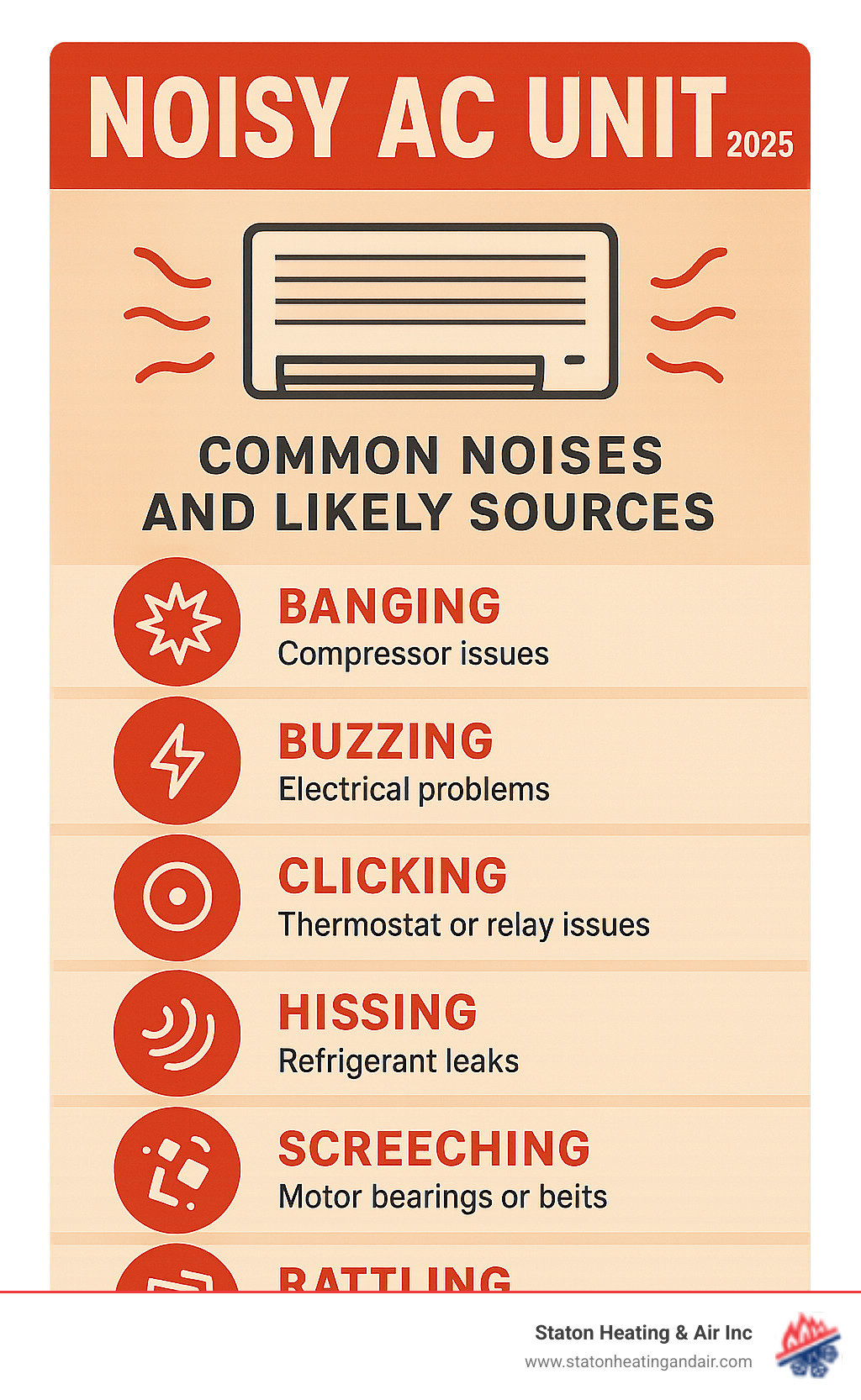
A Homeowner's Dictionary to a Noisy AC Unit
When your air conditioner makes noises other than a gentle hum, it's signaling a problem. Modern central air systems are designed for quiet operation, so any loud or disruptive sound indicates a moderate to severe issue. Understanding what each noise means can help you decide whether to attempt a DIY fix or call a professional. Let's decode the common sounds from your noisy AC unit.
| Noise Type | Common Causes | Severity Level | Recommended Action |
|---|---|---|---|
| Banging/Clanking | Compressor issues (loose internal parts like piston pin, connecting rod), imbalanced fan blades (hitting other components), loose major components | High | Professional |
| Buzzing | Electrical issues (failing circuit breaker, bad capacitor, loose wiring), faulty fan motor, dirty condenser coils, loose components, refrigerant leak, frozen evaporator coils | Moderate to High | DIY (for frozen coils/cleaning) or Professional (electrical/refrigerant/motor) |
| Hissing/Bubbling | Refrigerant leak, air duct leaks, malfunctioning expansion valve, incompatible air filter, damaged/blocked drainage pipe | High | Professional (refrigerant/ducts/expansion valve), DIY (drainage for minor clogs) |
| Clicking | Malfunctioning thermostat, electrical relay switch issues, compressor capacitor issues (continuous clicking) | Moderate to High | DIY (thermostat battery/reset), Professional (electrical/component failure) |
| Squealing/Screeching | Malfunctioning fan motor (indoor/outdoor), broken compressor motor, damaged/dry bearings, impaired/loose fan belt, high internal compressor pressure | High | Professional |
| Rattling | Debris in outdoor unit, loose parts (electrical contactor, fan blades), damaged electrical contractor | Low to Moderate | DIY (debris removal, tightening screws), Professional (damaged contractor/internal loose parts) |
What Causes a Banging or Clanking Noise?
A banging or clanking noise is a serious red flag, often pointing to a problem with the compressor, the heart of your AC. Loose internal parts like a piston pin or connecting rod can cause this sound. Another cause is severely imbalanced fan blades in the indoor or outdoor unit hitting other components as they spin, which can lead to significant damage.
The severity of this noise is high. Turn off your AC immediately to prevent a complete breakdown, which could lead to expensive repairs or a full system replacement. Professional help is necessary for banging sounds. Our team can help you decide between repair or replacement.
Why is My AC Unit Buzzing?
A buzzing sound from your noisy AC unit can have causes ranging from minor to serious. Loud buzzing often indicates an electrical issue, such as a failing circuit breaker, a bad capacitor, or loose wiring, all of which are potential safety hazards. Other causes include a faulty outdoor condenser fan motor, loose fan blades, or dirty condenser coils making the system work harder. Buzzing from the indoor unit might mean frozen evaporator coils, usually due to a dirty air filter.
More severe causes include a refrigerant leak or loose components vibrating. While you might be able to fix frozen coils or clean components yourself, electrical or refrigerant issues require a professional. Learn more about why ACs make buzzing sounds in Dawsonville and what causes a circuit breaker to trip on an AC.
What Does a Hissing or Bubbling Sound Mean?
Hissing or bubbling from your AC is a high-severity issue, usually related to refrigerant lines. The most common cause is a refrigerant leak, where you hear pressurized gas escaping. This is a serious problem that harms your AC's cooling ability, the environment, and can damage the compressor. A hissing sound could be a dangerous refrigerant leak.
Bubbling can also indicate a refrigerant leak or a problem with the condensate drainage system, where a blockage causes water to back up. Other causes of hissing include air duct leaks or a malfunctioning expansion valve. Since refrigerant leaks require an EPA-licensed technician, these sounds almost always need a professional. If your AC unit is leaking refrigerant in Dunwoody, we can help.
Why is My AC Clicking Repeatedly?
A single click when your AC starts or stops is normal. However, repeated clicking during a cycle or when the unit fails to turn on indicates a problem. This could be caused by a malfunctioning thermostat that's constantly sending signals, or an electrical control issue like a faulty relay switch. Failing capacitors in the compressor can also cause clicking.
While you can try replacing the thermostat battery, most clicking issues require a professional to diagnose complex electrical problems. Ignoring the sound can lead to further damage or a complete system failure. For expert AC troubleshooting, our team can help.
What's That High-Pitched Squealing or Screeching?
A high-pitched squealing or screeching from your noisy AC unit signals serious mechanical wear, like metal-on-metal friction, and requires immediate attention. A common cause is a malfunctioning fan motor in either the indoor or outdoor unit, where worn or dry bearings create a piercing squeal. In older systems, a worn fan belt can also cause screeching.
A more critical cause, especially if the sound is brief on startup, is high internal pressure within the compressor, which can lead to failure. A screeching noise always indicates a serious problem that needs immediate professional repair to prevent extensive damage. If a broken motor is making a shrieking noise, it needs to be addressed quickly. Our team has the solutions for these strange AC noises.
Simple DIY Fixes for a Quieter AC
Not every sound from your noisy AC unit means an expensive repair. Some issues are simple DIY fixes. However, safety is job number one. Before touching your unit, you must turn off the power at both the thermostat and the main circuit breaker to prevent accidental startups and electrical shock. Once the power is off, you can begin your inspection.
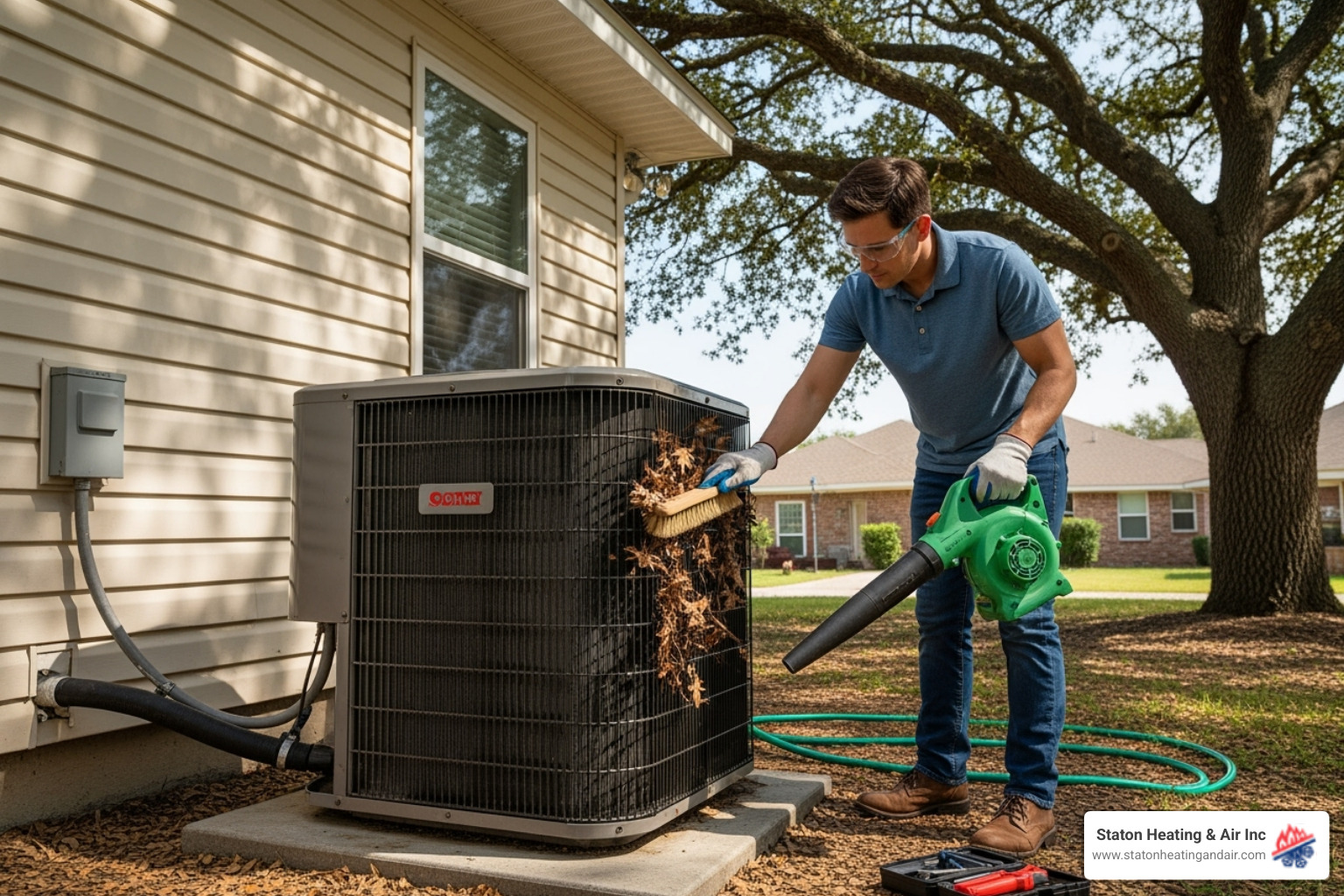
Inspect and Clean the Outdoor Unit
Your outdoor AC unit collects debris like twigs, leaves, and grass clippings. This buildup can get caught in the fan or block airflow, causing rattling sounds and making the unit work harder. After turning the power off, carefully remove the outer panels and gently brush away debris from the fins and fan. Also, check that the unit is level to prevent vibrations and ensure all panel screws are tight to silence rattles. Keeping the outdoor unit clean is a simple way to prevent a noisy AC unit. For more tips, see our guide on How Do You Maintain Your Outside AC Unit.
Check and Replace Your Air Filter
A dirty air filter is a common cause of a noisy AC unit. As the filter clogs with dust and debris, it restricts airflow, forcing your system to work harder. This strain can cause humming, buzzing, or whistling sounds, along with reduced cooling and higher energy bills. In severe cases, it can cause evaporator coils to freeze.
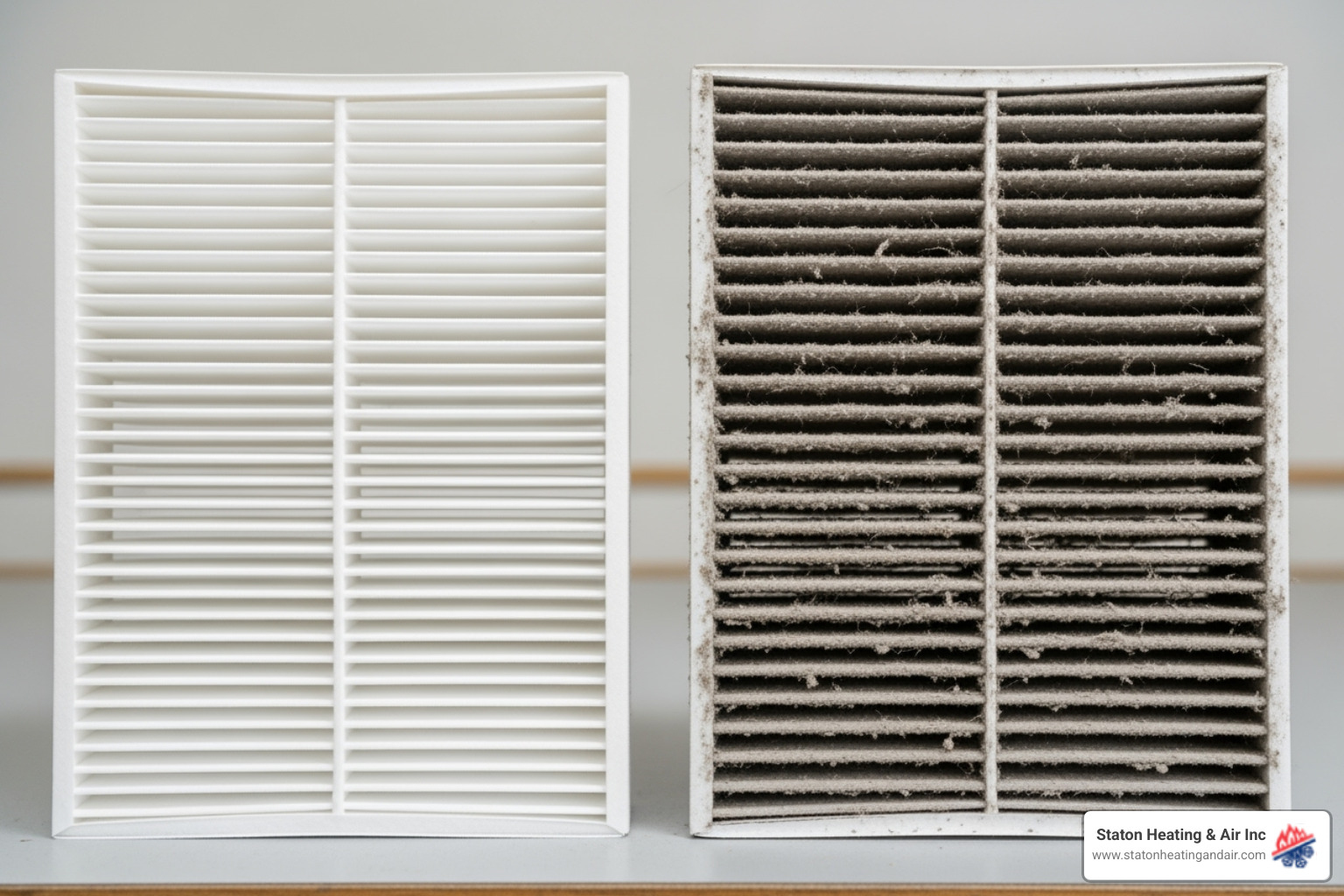
This is an easy fix. Check your filter monthly and replace it every 1 to 3 months, depending on your home environment. A clean filter is an inexpensive way to improve performance and quiet your AC. For more guidance, learn How to Clean an HVAC Filter.
Clear the Condensate Drain Line
A gurgling or bubbling sound from your indoor unit, often with a musty smell or a puddle of water, usually means a clogged condensate drain line. Your AC creates condensation as it cools, and this water drains away through a pipe. Over time, algae, mold, and sludge can block this pipe, causing water to back up. The gurgling is air escaping through trapped water. If not fixed, this can lead to water damage or shut down your system.
For minor clogs, you can use a wet/dry vac on the outdoor end of the drain line to suction out the blockage. Pouring distilled vinegar down the line can also help break down algae. For detailed instructions, see our guide on How to Unclog a Trane Air Conditioner.
When to Stop and Call an HVAC Professional
While some AC fixes are DIY-friendly, your noisy AC unit may need a professional. Certain issues are too complex or dangerous for homeowners. Handling electrical components or refrigerants carries risks like electric shock and chemical exposure. Without proper tools and training, you could cause more damage, leading to costlier repairs. Our NATE-certified technicians have the tools, knowledge, and safety training to diagnose and fix any AC problem correctly.
Red Flags for Your Noisy AC Unit
Certain sounds and symptoms are clear signals that you need an HVAC expert. Never ignore these red flags:
- Loud banging or screeching: Indicates a serious internal problem with the compressor or fan motors that could lead to system failure.
- Hissing sounds: Often a sign of a refrigerant leak, which requires a licensed professional to handle safely.
- Electrical buzzing or burning smells: A potential fire hazard. Turn off your AC at the breaker immediately and call for help.
- AC won't turn on or blows warm air: If your noisy unit stops working or isn't cooling, it needs a professional diagnosis.
- Excessive water pooling: Significant water leaks can point to a major condensate system issue or a frozen coil.
These are critical warning signs that you need an air conditioner repair. Our team is ready to help. 9 Warning Signs That You Need an Air Conditioner Repair
The Dangers of Ignoring a Noisy AC Unit
Ignoring a noisy AC unit can lead to bigger problems and higher costs. Here are the long-term consequences:
- Accelerated component failure: A small issue like a worn bearing can stress other parts, causing a domino effect of failures throughout the system.
- Higher energy bills: A noisy, inefficient unit works harder to cool your home, consuming more electricity. A quiet, efficient AC helps you Save energy.
- Complete system breakdown: Ignoring warning signs can lead to a total system failure, often on the hottest day of the year.
- Costly repairs or replacement: Putting off a small repair can lead to much more expensive fixes or even the need for a full system replacement. Addressing problems early is always more cost-effective.
Our team is here for AC Repair Cumming GA to help you prevent these expensive scenarios.
The Role of Regular Maintenance in Preventing Noise
Regular maintenance is the secret weapon against a noisy AC unit. Like a car, your AC needs consistent care to run quietly and efficiently. Maintenance helps catch small problems before they become loud and expensive, protecting your investment in home comfort. A well-maintained system is more efficient, lasts longer, and keeps energy bills down.
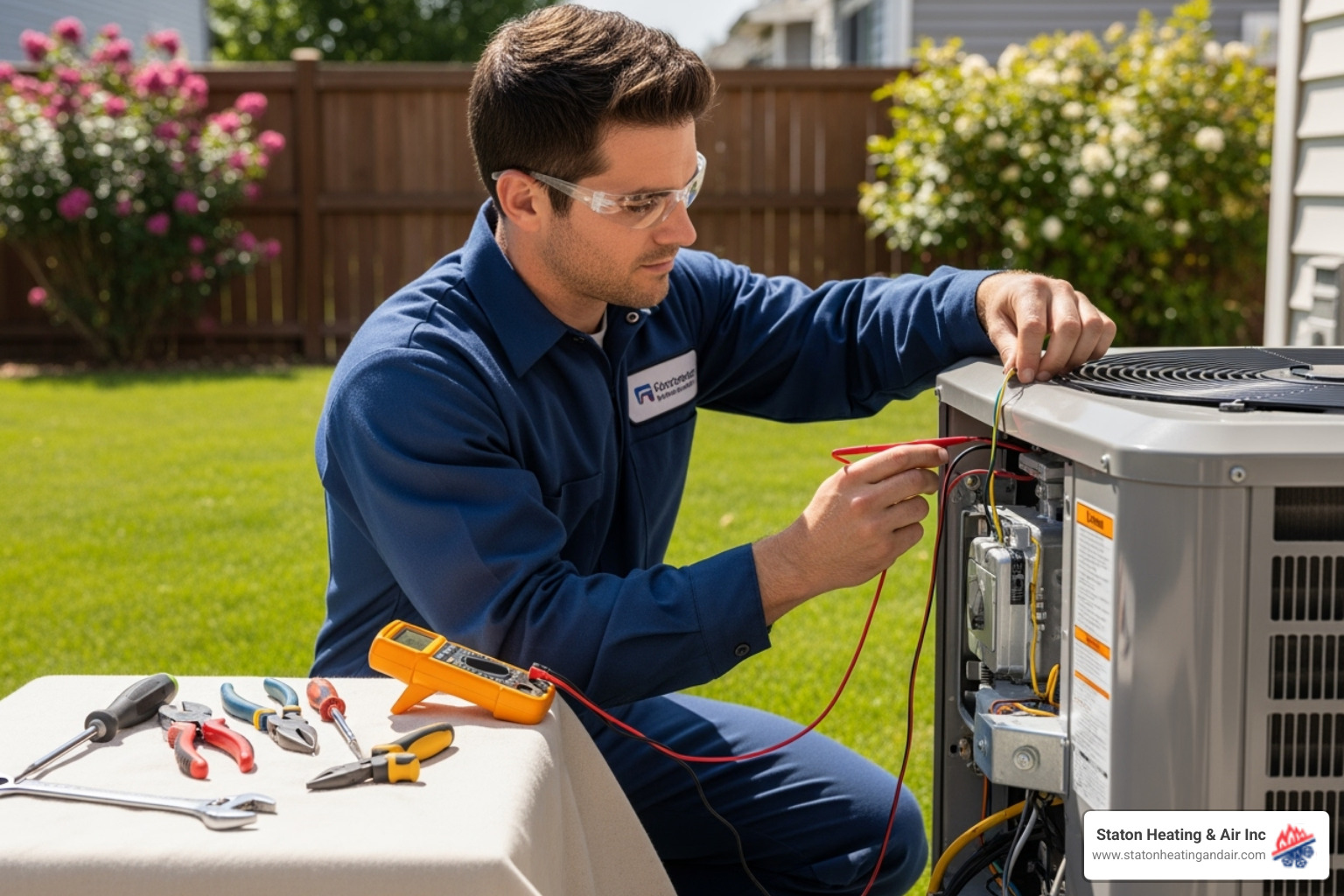
What's Included in a Professional Tune-Up?
During a professional tune-up, our NATE-certified technicians perform key tasks to prevent noise:
- Lubricating moving parts: Prevents grinding and squealing from fan motors and bearings.
- Tightening electrical connections: Stops electrical buzzing and reduces fire hazards.
- Cleaning coils: Dirty indoor and outdoor coils cause the system to work harder and louder.
- Checking refrigerant levels: Incorrect levels can strain the compressor and cause noise.
- Calibrating the thermostat: Ensures smooth cycling and prevents repeated clicking.
These steps keep your system in harmony and your home quiet. Regular service is a smart investment, as explained in The Benefits of Servicing Your Air Conditioning Regularly. Seasonal tune-ups are key, so learn about AC Maintenance for Every Season.
How Age and AC Type Affect Noise
The age and type of your AC system significantly affect its noise level.
Older systems (10-15+ years) are naturally louder due to component wear. Worn bearings and stretched belts in older models can cause rumbling and squealing.
Modern variable-speed units are engineered for whisper-quiet operation, some as low as 19 decibels. They adjust their speed to meet cooling demands, running at lower, quieter levels for longer periods.
The type of system also matters. Central air keeps the noisiest parts, like the compressor, outside. Window units contain all components in one box, making them inherently louder.
If your AC is excessively loud, it might be time for an upgrade. Modern systems are quieter, more energy-efficient, and more reliable. Consider Upgrading Your Outdated AC System to explore your options. While maintenance helps, newer technology offers superior quiet performance.
Restore Peace and Quiet to Your Home
Understanding your AC's sounds, from a simple rattling to a serious squealing, empowers you as a homeowner. You now know how to handle simple DIY fixes like cleaning the outdoor unit or changing an air filter to restore quiet and prevent larger issues.
However, for complex problems involving electrical components, refrigerant leaks, or major mechanical failures, calling a professional is essential for your safety and to prevent costly damage. This is where Staton Heating & Air Inc. comes in. Living by our motto, "Where customers come first!", we have served Cumming, GA, Metro Atlanta, North Georgia, Milton, Alpharetta, and Johns Creek since 1972. We were proudly named 2024's Best HVAC Company in Cumming.
Our NATE-certified technicians have the expertise and tools to diagnose and resolve any noisy AC unit issue, restoring peace and efficiency to your home. Don't let a noisy AC disrupt your comfort or increase your energy bills. When you're in doubt or facing a complex problem, trust our experts to get the job done right.
Recent Posts
What Our Customers Are Saying


Ready to Transform Your Home?

Recent Blog







